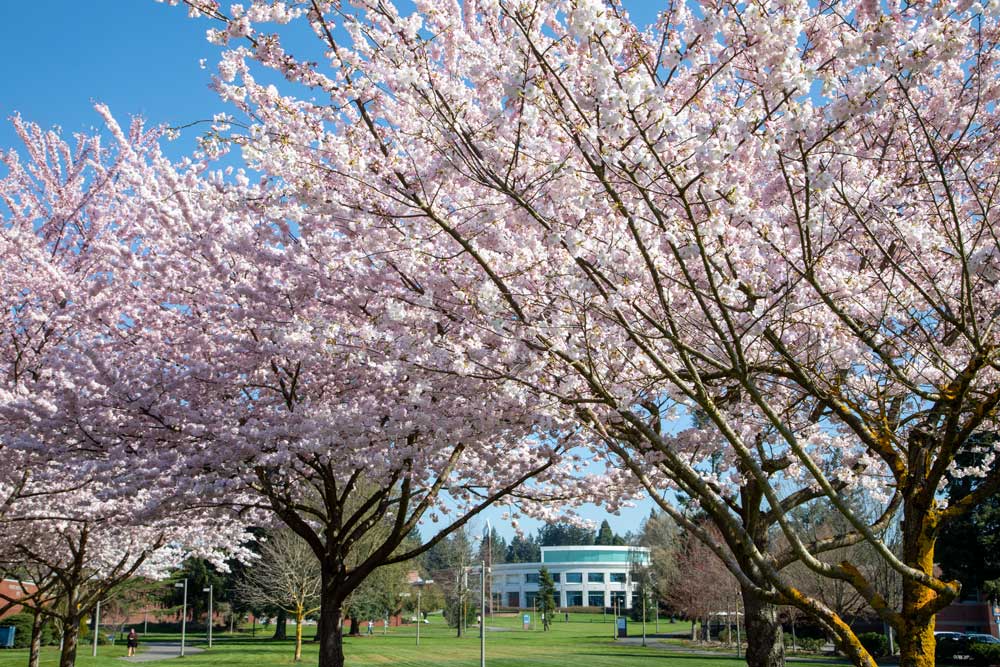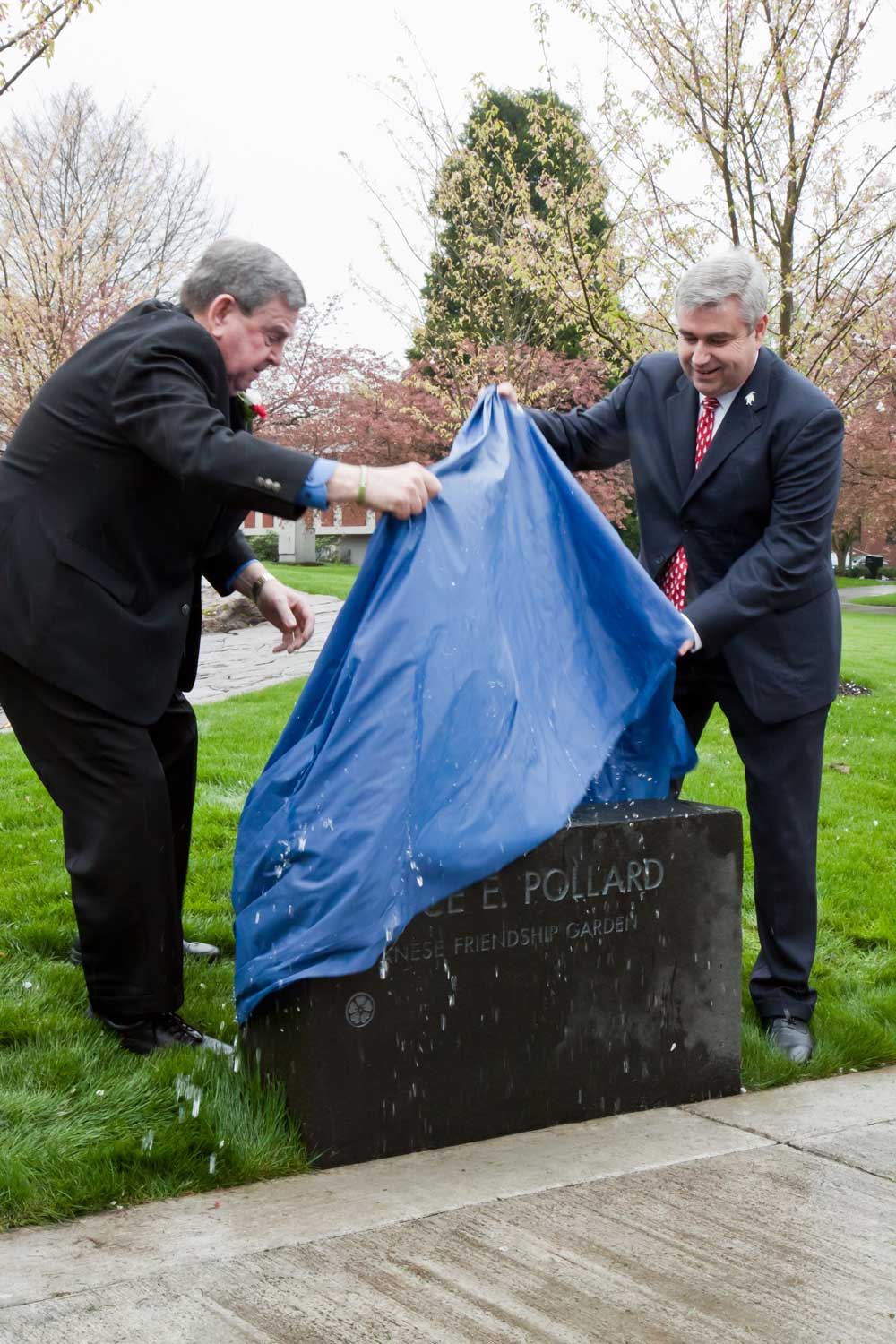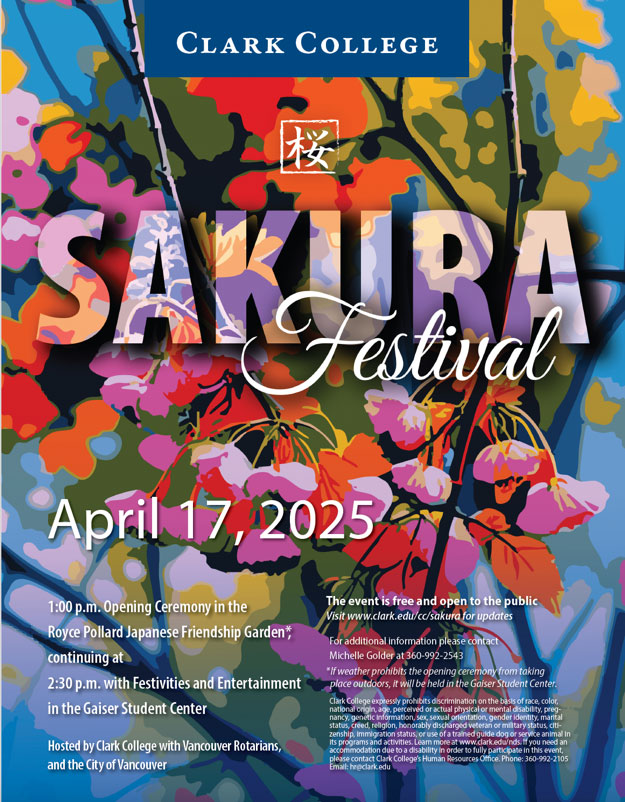Clark College Celebrates Sakura Festival on April 17
For Immediate Release
April 9, 2025
Annual event celebrates friendship between cultures

VANCOUVER, Wash. — The annual Sakura Festival returns on Thursday, April 17 to the Clark College main campus, 1933 Fort Vancouver Way. Weather permitting, this free community event is typically held beneath a canopy of cherry blossoms, and is presented by Clark College, the city of Vancouver, and Vancouver Rotary.
Opening remarks begin at 1 p.m. in the Royce Pollard Japanese Friendship Garden, located next to Beacock Music Hall on Clark's main campus. In case of inclement weather, the event will be inside Gaiser Student Center in the Penguin Union Building.
New this year: Hosted by Student Life, there will be a special display and release of a Butterfly Garden in addition to this year's music and performances. In the Japanese culture, butterflies hold deep symbolic meaning, representing symbols of transformation, renewal, and the fleeting beauty of life. They also signify the connection between the physical and natural worlds. Butterfly motifs are often featured in Japanese literature, various art form, textile, and household items, serving as a celebration of beauty, fragility, and harmony with nature.
History of Sakura Festival at Clark College

More than 25 years ago, the City of Vancouver received a gift of friendship: 100 Shirofugen cherry trees from Mr. John Kageyama, President of America Kotobuki in commemoration of the 100th anniversary of Washington's statehood. These trees were planted at Clark College, creating an enduring reminder of the bonds between our region and Japan.
Twenty years after the trees were planted, Clark College was bequeathed another generous gift from Dr. Chihiro Kanagawa, CEO of Shin-Etsu to build a Japanese Friendship Garden. At his request, the garden was named the Royce E Pollard Japanese Friendship Garden for his role in promoting international friendship.
Royce Pollard and Bob Knight were both present at the dedication ceremony on April 19, 2012.
Over the years, those trees have grown and blossomed—as has that friendship, creating traditions like the establishment in 1995 of a sister-city relationship between Vancouver and Joyo, Japan, and our annual Sakura Festival, begun in 2006.
Learn more about the history of the Sakura Festival
2025 Schedule
12:50 p.m.– Koto performance by Yukiko Vossen, accompanied by LeeAnn McKenna.
1:00 p.m. – Ceremony and greetings from:
- Clark College President Dr. Karin Edwards
- City of Vancouver Mayor Anne McEnerny-Ogle
- Mr. Yuzo Yoshioka Consul General of Japan
- Clark College student, Nicole Vara, who studied abroad in Japan
1:30 p.m. – Clark College Treble Ensemble performance.
1:40 p.m. – Enroute to the Gaiser Student Center, guests are invited to enjoy the Japanese garden and to stop by Andersen Fountain to visit the Student Life Butterfly Garden.
2:00 p.m. – Butterflies Release, Andersen Fountain Courtyard
- Butterflies hold significant symbolic meaning in Japanese culture, representing a variety of themes and ideas. Their imagery appears frequently in traditional Japanese art, literature, and aesthetics, embodying various aspects of life, nature, and the human experience.
2:00 p.m. – Activities, displays and performances, Gaiser Student Center
- A Haiku reading by Clark College Japanese Club
- Traditional Japanese Noh performance “Fuji Musume” (Wisteria Maiden)
- Art share by children enrolled in Child and Family Studies program
- Taiko Drum performance by Takohachi Taiko.
- Variety of cultural displays and demonstration tables around the room.
- Hand-painted cherry blossom cookies by the college's Professional Baking & Pastry Arts students.
3:15 p.m. - Event adjourns
The Sakura Festival event is free and open to the public.
Driving directions and parking maps are available at www.clark.edu/maps.
Address: 1933 Fort Vancouver Way, Vancouver, WA 98663.
Accommodations: If you need an accommodation due to a disability in order to fully participate in this event, please contact Clark College's Human Resources Office. Phone: 360-992-2105 or email: hr@clark.edu.
Clark College expressly prohibits discrimination on the basis of race, color, national origin, age, perceived or actual physical or mental disability, pregnancy, genetic information, sex, sexual orientation, gender identity, marital status, creed, religion, honorably discharged veteran or military status, citizenship, immigration status, or use of a trained guide dog or service animal in its programs and activities. Learn more at www.clark.edu/nds.
About Clark College
Founded in 1933, Clark College provides residents of Southwest Washington with affordable, high-quality academic and technical education. It is a public community college offering more than 100 degree and certificate programs, including bachelor's and associate degrees; professional certificates; high school diplomas and GED preparation; and non-credit community and continuing education. Clark serves a wide range of students including high school students, displaced workers, veterans, parents, non-native English speakers, and mature learners. Approximately 45% of its students are in the first generation of their families to attend college.
For additional information: (media inquiries & photo requests):
Maureen Chan-Hefflin, Clark College Communications & Marketing
T: 360-992-2243 E: mhefflin@clark.edu

